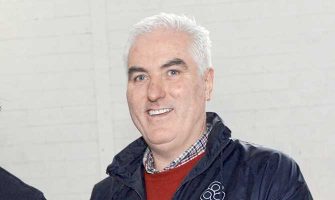
Ben Gilroy
IT WAS reported this week that Goldhawk’s old pal, Direct Democracy founder Ben Gilroy, is the subject of a High Court order from Judge Robert Haughton preventing him from taking certain legal actions and from providing advice to others who find themselves before the courts. The lengthy and hard-hitting judgment included an interesting insight into Gilroy’s modus operandi.
Although not initially directly involved, Gilroy became a central figure in a long-running legal action between AIB and borrower Seamus McQuaid. Two others who feature prominently in Haughton’s ruling were legal eagle Claire Callanan and AIB senior suit Philip Butler, both of whom came in for special attention from Gilroy.
At one stage, Callanan was described in a letter from Gilroy as a “Jewish Rodef”, which was said to mean a person who was “a legitimate target for murder or assault”. The solicitor, who alleged “personalised intimidation”, made a complaint to the gardaí and Gilroy’s missive was one of the factors taken into account when he was found guilty of criminal contempt. Haughton described as “abhorrent” the targeting of AIB’s legal representatives.
Butler, meanwhile, was described by Gilroy as “a very dangerous man” – a comment described by the judge as “an egregious and a gross misuse of the absolute privilege”.
Gilroy also sent material to Callanan’s home address and to that of Butler and AIB chief executive Bernard Byrne. Haughton found that the use of home addresses was a tactic used by Gilroy to “intimidate the plaintiff, its employees and legal advisors”. He issued an order restraining Gilroy from going to AIB’s headquarters or the homes of assorted parties.
The issue of Gilroy’s finances also came in for some special mention from Haughton, who found that bolshy Ben was being “dishonest when he indicated he was without income”. He noted that Judge Brian McGovern had previously forwarded a transcript of a related High Court hearing to the Revenue and the DPP, based on anomalies between information provided when Gilroy sought free legal aid and when the activist was ordered to do community service.
There was also a strong suspicion that Gilroy may have earned a few bob from his role as a trustee in something called the Morrigan Private Settlement Trust. At one stage, this trust claimed ownership of assorted valuable properties (the subject of charges by AIB), although McQuaid later undertook to have those assets transferred back into his name. The issue of “fees” allegedly paid to the trust was also raised by Haughton, who found that Gilroy had “colluded” with McQuaid to put the McQuaid properties (worth over U2m) beyond the reach of AIB. The judge noted that Gilroy “is probably in receipt of remuneration… in respect of his activities as a trustee”.
The matter of Gilroy acting as what Haughton described as a “litigation agent” for McQuaid featured strongly in the judgment. The judge found that correspondence from the McQuaid family had in fact been drafted by Gilroy, who had clearly provided legal advice. Haughton described advice provided by Gilroy as “both dishonest and misguided”.
However, the industrious Ben, who has been involved in at least 16 High Court cases, may not agree with the “litigation agent” tag. Although he previously filed a document in the Companies Office in which he was described as a “legal advisor”, a more recent filing in relation to another company lists Gilroy’s occupation as that of a humble electrician. He certainly knows how to make the sparks fly.




















